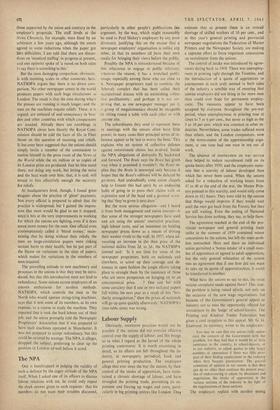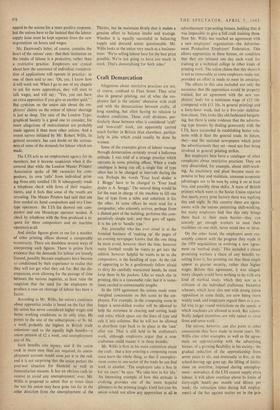Labour Supply
Obviously, restrictive practices would not be possible if the unions did not exercise effective control over the supply of labour; and this brings us to what I regard as the kernel of the whole printing controversy. It is worth examining in detail, as its effects are felt throughout the in- dustry, in newspapers, periodical, book and general printing production. The employers allege that ever since the war the unions, by their control of the intake of apprentices, have main- tained a chronic shortage of labour, and have strangled the printing trade, preventing its ex- pansion and forcing up wages and costs, parti- cularly in big printing centres like London. They estimate that at present there is an overall shortage of skilled workers of 10 per cent., and at this year's general printing and provincial newspaper negotiations the Federation of Master Printers and the Newspaper Society are making a supreme effort to force important concessions on recruitment from the unions.
The control of intake was introduced by agree- ments dating back to 1919. There was unemploy- ment in printing right through the Twenties, and the introduction of a quota of apprentices to ii journeymen in each craft seemed to both sides of the industry a sensible way of ensuring that unwise employers did not bring in far more men than could ever hope for permanent employ- ment. The measures appear .to have been accepted by everyone throughout the pre-war period, when unemployment in printing rose at times to 5 or 6 per cent., but never as high as the 9 or 10 per cent. which was common in other in- dustries. Nevertheless, some trades suffered more than others, and the London compositors, now at the storm-centre of the apprenticeship argu- ment,, at one time had one man in ten out of work.
The absence of journeymen on war service then helped to reduce recruitment (still on its quota basis) after 1939; and the employers main- tain that a scarcity of labour developed then which has never been cured. When the unions asked for a reduction of working hours from 45 to 40 at the end of the war, the Master Prin- ters pointed to this scarcity, and would only come down to 431 hours. They were told by the unions that things would improve if they would wait until the men got back from the Forces; but they are still waiting. Even the ending of National Service has done nothing, they say, to help them.
The agreement reached at the end of the pro- vincial newspaper and general printing trade strike in the summer of 1959 contained minor concessions by the unions, but left the main prob- lem untouched. Here and there an individual union permitted a 'bonus intake' of a small num- ber of apprentices or agreed to adult apprentices, but the only general relaxation of the system was an agreement that if one firm did not want to take up its quota of apprenticeships, it could be transferred to another.
What have the unions to say to this, the most serious complaint made against them'? This year, the problem is being raised afresh, not only on the occasion of the new wage negotiations, but because of the- Government's general appeal to industry not to miss the opportunity offered for recruitment by the 'bulge' of school-leavers. The Printing and Kindred Trades Federation has given a cool reception to this appeal. Mr. G. G. Eastwood. its secretary, wrote to the employers : You may be sure that our unions fully appre- ciate the concern of the Government with the problem. but they feel that it would be of little assistance to the country, to school-leavers, or to our industrY, to adjust quotas to take larger numbers of apprentices if there was little pros- pect of their finding employment in the industry when they became journeymen. The general consensus of opinion in our unions is that they can do no other than continue the present prac- tice of endeavouring to adjust, by discussion and negotiation, the intake of apprentices in the various sections of the industry in the light of the requirements of those sections.
The employers replied with another strong appeal to the unions for a more positive response, but the unions have so far insisted that the labour supply issue must be kept separate from the new negotiations on hours and wages.
Mr. Eastwood's letter, of course, contains the heart of the unions' case : that their limitation on the intake of labour is a protective, rather than a restrictive practice. Employers are cynical about how the assurance of individual considera- tion of applications will operate in practice : as one of them said to me: 'Oh, yes, 1 know how it will work out. When I go to one of my chapels to ask for more apprentices, they will start to talk wages, and will say : "Yes, you can have an extra apprentice if you give us another quid." But cynicism on the union side about the em- ployers' claims on the extent of labour shortage is just as deep. The case of the London Typo- graphical Society is a good one to consider, for more allegations of restrictionism are probably made against it than most other unions. And a recent survey initiated by Mr. Robert Willis, its general secretary, has cast doubt on the serious- ness of some of the demands for labour which are made.
The LTS acts as an employment agency for its members, but it became suspicious when it dis- covered that while the London Master Printers' Association spoke of 500 vacancies for com- positors, its own 'calls' from individual print- ing firms only totalled 130. It subsequently made a telephone check with firms of their require- ments, and it feels that some of the results are revealing. The Master Printers had said that one firm needed six hand compositors and two Lino- type operators : the LTS list showed one com- positor and one Monotype operator needed. A check by telephone with the firm produced a re- quest for three compositors and no machine operators at all.
And similar figures given to me for a number of other printing offices showed a comparable eccentricity. There are doubtless several ways of interpreting such figures. There is prima facie evidence that the demands for labour are loosely framed, possibly because employers have become so conditioned by their experience to realise that they will not get what they ask for. But the dis- crepancies, even allowing for the passage of time between the various inquiries, at least raise the suspicion that the need for the employers to produce a case on shortage of labour has been a factor.
According to Mr. Willis, his union's canniness about apprentice intake is based on the fact that his union has never considered higher wages and better working conditions as its only aims. He points to the size of the subscriptica—at 9s. 6d. a week probably the highest in British trade unionism—and to the equally high benefits—a union pension of £2 a week, and unemployment pay of 36s.
Such benefits cost n‘p ney, and if the union took in more men than are required, its unem- ployment account would soon put it in the red; and it is not surprising that the union prefers the post-war situation for financial as well as humanitarian reasons. It has an obvious cash in- centive to avoid any unemployment, ever. Mr. Willis is prepared to admit that at times since the war his union may have gone too far in the other direction from the unemployment of the Thirties, but he maintains firmly that it makes a genuine effort to balance intake and wastage. Whether it is equally successful in balancing supply and demand seems questionable. Mr. Willis looks at the union very much as a business- man : 'We're selling labour here for the best price possible. We're not going to have too much in stock. That's demoralising for both sides.'







































 Previous page
Previous page